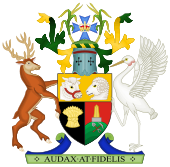Queensland Legislative Council
| Legislative Council | |
|---|---|
 |
|
| Type | |
| Type | |
| History | |
| Established | 1 May 1860 |
| Disbanded | 23 March 1922 |
| Succeeded by | Unicameral Parliament of Queensland |
| Meeting place | |
| Legislative Council Chamber Parliament House, Brisbane Queensland, Australia |
|
The Queensland Legislative Council was the upper house of the parliament in the Australian state of Queensland. It was a fully nominated body which first took office on 1 May 1860. It was abolished by the Constitution Amendment Act 1921, which took effect on 23 March 1922.
Consequently, the Legislative Assembly of Queensland is the only unicameral state Parliament in Australia. Two territories, the Northern Territory and Australian Capital Territory, also maintain unicameral parliaments.
Most of the early members of the Council came from wealthy families, were well educated and were born in England.Absenteeism was a problem in the early years, with some members returning to England, being absent for several years.
The Legislative Council was seen by the Australian Labor Party as undemocratic and a tool of patronage, and upon the establishment of a secure Labor majority in the Assembly in 1915, Labor sought the house's abolition. Bills for this purpose were rejected by the Council itself in 1915 and 1916, and a referendum failed on 5 May 1917 on a vote of 179,105 to 116,196. In 1920, the Government under Premier Ted Theodore changed tack, persuading the Governor of Queensland to appoint additional Labor members of the Council, thus securing a majority in that Chamber.
The abolition bill was eventually passed by the Assembly on a 51–15 vote on 24 October 1921. The bill was then introduced to the Council by the leader of the Government in the Council, Alfred James Jones, who remarked, "Until we had a majority here, [the Council] was obstructive, and now that we have a majority here it is useless." However, Opposition councillor Patrick Leahy protested that the abolition of the chamber would result in the Assembly being "able to do what it thinks fit" and becoming unaccountable. On 27 October 1921, the Council voted itself out of existence; the members who voted for the abolition were known as the "suicide squad". The Council rose for the last time at 8:37 p.m. that evening.
...
Wikipedia
